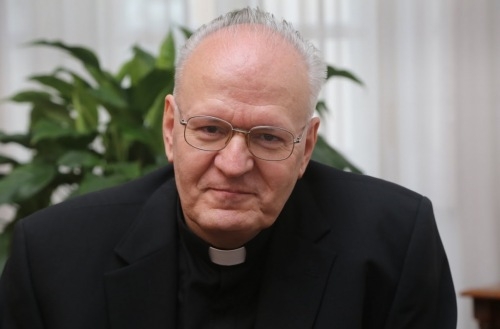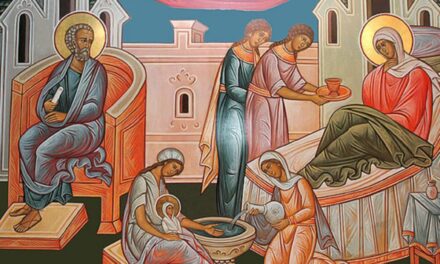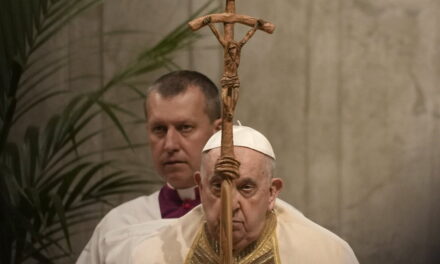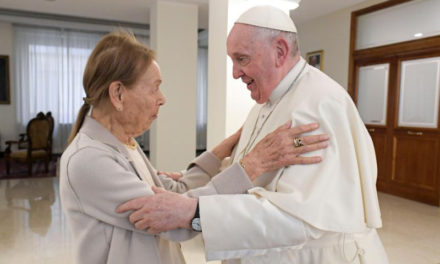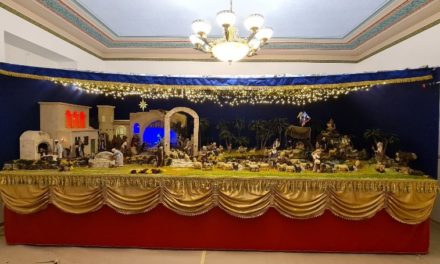He is a conservative who is faithful to his teaching, who speaks to all interest groups, while not making the teaching of Jesus an object of negotiation. Some criticize his aloofness, but those who know him closely also love him for his fatherly gestures. Portrait of the 70-year-old head pastor.
The first man of the Hungarian Catholic Church turned 70: Cardinal Péter Erdő reached the venerable age on June 25, and although his birthday falls on a Saturday, the church celebration was already held on Wednesday in Esztergom, where, in addition to the members of the Hungarian Catholic Bishops' Faculty, the clergy of his diocese, relatives and state leaders also celebrated with him.
Among others, former President János Áder, Speaker László Kövér, András Zs. Varga, President of the Kúria, and Deputy Prime Minister Zsolt Semjén took their seats in the stalls of the Cathedral of Our Lady and Saint Adalbert in Esztergom. The welcoming homily was delivered by Canon László Süllei, who emphasized in his speech:
A life based on the word of grace unfolds before us in the cardinal's service".
During the persecutions
This "life based on the word of grace" started in Budapest, at the time of the greatest church persecutions, on June 25, 1952. The later cardinal was born into an intellectual family of six children, he was the oldest of his siblings. Among his ancestors are also Székely people, which is how the Sun and the Moon came to be in his episcopal coat of arms. He graduated from Budapest Piarist High School, one of the few remaining Catholic high schools, in 1970, and immediately after that he began his higher studies at the Esztergom University of Theology as a student of the Archbishop's Priest Education Institute. His superiors later sent him back to the capital, where he studied at the Central Seminary and Pázmány Péter Catholic University.
Teacher, head of department, dean, rector
He was ordained a priest on June 18, 1975. After serving as a chaplain for two years - armed with a doctorate in theology - he already studied in Rome, where he also obtained a doctorate in church law. Since then, he has been regarded as an internationally renowned connoisseur and practitioner of these two scientific fields.
He soon began to use his knowledge as a teacher for the benefit of the church: first he taught for eight years at the seminary in Esztergom, then he was an invited professor at the Pontificia Universita Gregoriana. In 1988, he joined the faculty of Pázmány Péter Catholic University (the institution was still operating under the name Pázmány Péter Academy of Religious Studies at the time), where he first became known as the head of the department and then as the dean of the Faculty of Religious Studies.
Over the years, many members of the Hungarian Church, now nationally significant, have attended his classes,
among his students we can find, for example, the current Archbishop of Veszprém, György Udvardy. In the last five years, he was already the rector of the university, which position he had to leave due to a higher appointment.
Head of the Hungarian Church
Because during these years he was consecrated as a bishop and, in addition to his university duties, he also served as an auxiliary bishop of the diocese of Székesfehérvár from 1999. However, the reason why he did not continue as rector of Pázmány was the archbishop's title: Szent II. Pope János Pál appointed him Archbishop of Esztergom-Budapest in December 2002.
In his speech already quoted above, László Süllei recalled this moment after nearly twenty years: "On the day before December 7, 2002, Friday afternoon, Péter Erdő, the rector, the bishop, visited Cardinal László Paskai - as he had done several times before , when a report had to be prepared for the dicasteries based on a legal opinion, a congregation, or the correct name today. The lawyer came, whose books we knew, and whom we met many times because of his university rector duties.
At that time, it was not yet known why I was leading one chief pastor to another.
II. On December 7, 2002, Pope János Pál appointed him as the 83rd chief pastor of our diocese, and he has been holding this shepherd's staff for almost twenty years." He was appointed archbishop in January 2003, and the Holy Pope created him a cardinal in October of that year.
Since he was consecrated as a bishop, he himself (with co-consecrators) consecrated fourteen senior pastors: most recently Benedek Fekete Szabolcs in April this year.
Those who spoke to Mandiner unanimously described the cardinal as a hard-working, thorough and thorough person, which - according to those who have known him for a long time - was always characteristic of him, but the higher he got to the position, the more he practiced these virtues.
"He is a great gift to the Hungarian Church," says his former student, Archbishop György Udvardy.
Like him, our other sources emphasize that the balanced personality of the cardinal is an important element in the institutional life of the Hungarian Church. And although there are many who criticize him for his somewhat impersonal style, a priest who knows him well warns us to pay attention to small gestures as well. As he says, the cardinal really acts like a father and cares a lot about those entrusted to him, which the press usually doesn't notice, but rather doesn't even pay attention to.
Scholar High Priest
Following in the footsteps of several famous predecessors, Péter Erdő did not separate himself from either science or the university sphere as a cardinal. He was the chancellor of the PPKE for five years, and after he was a doctor of the Hungarian Academy of Sciences and then a corresponding member, after a long time he became again a canon lawyer-theologian among the regular members of the Hungarian Academy of Sciences. In the meantime, he also holds the position of president of the Szent István Academy of Sciences.
In the midst of church diplomacy
Péter Erdő also served as president of the Council of European Bishops' Conferences between 2005 and 2016. According to our informants experienced in church diplomacy, the decade spent in this role brought significant recognition to the Hungarian high priest.
He had a memorable role in the midst of European value disputes, when he made a statement after the court's decision in the Lautsi case, which was transferred from Italy to Strasbourg. After it was declared that the right to freedom of conscience is not violated by the law requiring that every classroom in Italy have a crucifix,
Péter Erdő called the decision a "victory for Europe" in his press release as the president of the council.
There were significant milestones in his operation when Pope Francis (the third during whose pontificate he served as high priest) first appointed him chief relator of the extraordinary family synod held in 2014 and then of the 2015 episcopal synod. During our background discussions, several people believed that it was largely due to the Hungarian cardinal's diplomatic sense and skillful statements that the church's social teaching did not move in a more permissive direction earlier.
Recently, Western media articles reported that Péter Erdő could be considered a candidate to succeed Pope Francis as Péter's successor in governing the church. Some of our sources silently nod to this, but they add: what the press writes about is just one thing, and in fact these speculations do not increase the chances of any cardinal at the conclave.
Everyone talks to him
In relation to his work in the field of ecclesiastical diplomacy, those who speak about him in our newspaper emphasize his integrative role above all: while everyone knows he is conservative, he finds a voice in negotiations with different groups and is able to act as a compromise maker in individual ecclesiastical disputes. At the same time, adds one of our interlocutors, who knows the cardinal well, he does not let go of the teaching, he strives to preserve it.
From time to time, he draws attention to the fact that "Jesus' teachings are not negotiable".
For Péter Erdő, the International Eucharistic Congress held in Budapest in September 2021 gained great recognition. Although contrary to the original plans, due to the pandemic, the event took place a year later and with the participation of fewer foreign pilgrims, most of the high priests who planned to participate were also present in Hungary. They saw that the Hungarian church had organized a world event of high quality, which moved the Hungarian faithful and had a deep theological content, and they did not keep their words of appreciation about it.
My faith: grace
The concept of grace and its theology, as well as the teaching about it, are extremely important to the cardinal. His chief shepherd motto also echoes this: "In the beginning there was nothing but grace." A volume of interviews with him was also published, the Puritan title of which is just this; My faith: grace - but it undoubtedly sums up the point accurately.
Speaking to Mandiner earlier , Péter Erdő said:
"Once we are disciples of Jesus Christ, we cannot consider his actual teaching, his real, authentic heritage as an object of negotiation. It's not like if it's less popular, we're going to say something else."
And remaining faithful, according to the cardinal, is nothing but a grace for which to give thanks.
Photo: Tamás Thaler

